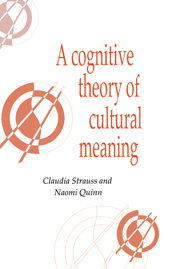Part II - Implications for a theory of culture
Published online by Cambridge University Press: 05 June 2012
Summary
Cultural understandings have five centripetal tendencies. First, they can be relatively durable in individuals. Secondly, cultural understandings can have emotional and motivational force, prompting those who hold them to act upon them. Thirdly, they can be relatively durable historically, being reproduced from generation to generation. Fourthly, they can be relatively thematic, in the sense that certain understandings may be repeatedly applied in a wide variety of contexts. Finally, they can be more or less widely shared; in fact, we do not call an understanding “cultural” unless it is shared, to some extent, in a social group. Various writers and traditions in cultural anthropology have been concerned with one or another of these properties or a subset of them; our account addresses all of them within a unified framework.
Furthermore, these centripetal tendencies are reconciled within this framework with the equally evident centrifugal tendencies of culture, which have earned so much recent anthropological attention. That is, cultural understandings can be changeable in persons and across generations; they can be unmotivating; they can be contextually limited; and they can be shared by relatively few in a society.
- Type
- Chapter
- Information
- A Cognitive Theory of Cultural Meaning , pp. 85 - 88Publisher: Cambridge University PressPrint publication year: 1998



